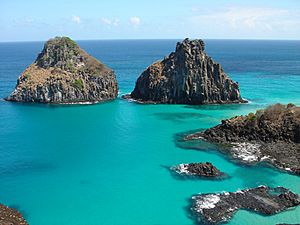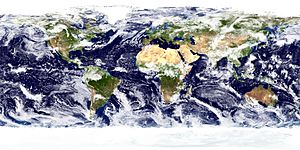Hydrology facts for kids

Hydrology is the study of water on Earth. It looks at how water moves, where it goes, and how clean it is. This includes water in the oceans, rivers, lakes, and even underground. A person who studies hydrology is called a hydrologist. They are like detectives for water, figuring out its journey.
The main idea in hydrology is understanding the water cycle. This is how water constantly moves around our planet. For example, water evaporates from the ocean. It then forms clouds. These clouds travel over the land and release water as rain or snow.
Contents
The Amazing Water Cycle
The water cycle is Earth's way of recycling water. It has several key steps. First, the sun heats water in oceans and lakes. This turns the water into vapor, which is a gas. This process is called evaporation. The water vapor then rises into the sky.
Clouds and Precipitation
As water vapor rises, it cools down. It then turns back into tiny water droplets or ice crystals. These gather together to form clouds. When these clouds get full of water, the water falls back to Earth. This is called precipitation. Precipitation can be rain, snow, sleet, or hail.
Water on Land
When precipitation hits the land, it can do many things. Some water soaks into the ground. This becomes groundwater. Groundwater is stored in spaces between rocks and soil. Other water flows over the land surface. This is called runoff. Runoff often flows into streams, rivers, and lakes. Eventually, it makes its way back to the ocean.
What Do Hydrologists Study?
Hydrologists study all parts of the water cycle. They look at how much rain falls in an area. They also measure how much water flows in rivers. They study how much water is stored underground. Understanding these things helps us manage our water resources.
Measuring Water
Hydrologists use special tools to measure water. They use rain gauges to see how much rain falls. They use sensors in rivers to measure water flow. They also drill wells to check groundwater levels. This data helps them predict floods or droughts.
Water Quality
Another important part of hydrology is water quality. Hydrologists test water to see if it is clean and safe. They check for pollution in rivers and lakes. They also study how pollution moves through water systems. This helps protect our drinking water.
Why Hydrology is Important
Hydrology is very important for our daily lives. It helps us find enough clean water to drink. It also helps us manage water for farming and industry. Hydrologists work to solve many water-related problems.
Protecting Against Floods
Hydrologists help communities prepare for floods. They study how rivers behave during heavy rain. They can predict when and where floods might happen. This allows people to take action and stay safe.
Managing Water Resources
Our planet has a limited amount of fresh water. Hydrologists help us use this water wisely. They advise on how much water can be taken from rivers or underground. This ensures there is enough water for everyone, now and in the future.
Related pages
Images for kids
-
Rain over a Scottish catchment. Understanding the cycling of water into, through, and out of catchments is a key element of hydrology.
-
The Roman aqueduct at Caesarea Maritima, bringing water from the wetter Carmel mountains to the settlement.
-
A flood hydrograph showing stage for the Shawsheen River at Wilmington.
-
A standard NOAA rain gauge
-
Plan view of water flow through a catchment simulated by the SHETRAN hydrological modelling system.
See also
 In Spanish: Hidrología para niños
In Spanish: Hidrología para niños
 | Laphonza Butler |
 | Daisy Bates |
 | Elizabeth Piper Ensley |









